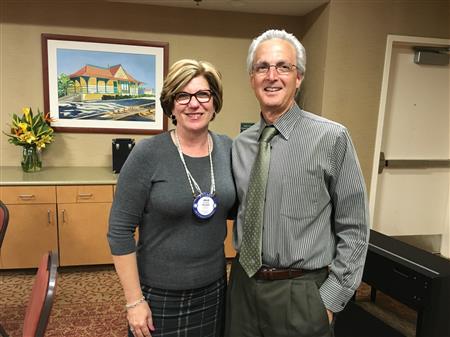Interventional Cardiology
Posted by Bill Baer
on May 03, 2016
Dr. Paul Sarkaria is a cardiologist who has been working in the tri-city area for 28 years. His presentation was on interventional cardiology and the latest cutting edge interventions that are being done.
Dr. Sarkaria went on to explain that after the angioplasty the introduction of coronary stents came along. This procedure is done with a mesh, made of platinum or chromium, wrapped around the balloon which becomes embedded and forms a sort of scaffolding along the walls of the artery to reduce the chances of arterial narrowing. The next exciting development was mesh stents coated with medicated polymer. These stents not only help with healing properly but as the drug disappears the polymer dissolves. He stated that in Europe they are working on stents that completely dissolve over a period of time so nothing is left in the artery after it heals. These are not approved for the US yet but should be in the future.
Another exciting and new technique is that many of the procedures he does can be done through the radial artery (in the arm) instead of having to be the aorta (going through the groin, to the relief of many who had concerns about how they know EXACTLY where to go in that area).
The doctor passed around samples of the stents and balloons so that everyone could actually touch and feel the amazing materials he told us about. He also answered many questions about what can be done to prevent having this sort of issue and signs and symptoms of heart issues.
Dr. Sarkaria explained that lifestyle changes are the most important things we can do to prevent heart issues, especially for those of us with history of heart issues in the family. He stressed the importance of exercise, not smoking, healthy diet, and pointed out that if you are diabetic you have a much higher risk so controlling diabetes is a must. He was asked if getting a calcium score is a good indicator and he said that it can’t hurt. If your calcium score is high it could possibly mean you are more likely to build plaque and it’s a good idea to get it checked out.
The doctor said that they see more men than women 60/40 and that average age is 50-70 although they have had patients as young as 28. Unfortunately, often times there are no real symptoms (50%) until the artery is already 70% blocked. This can be chest discomfort or pressure, pain in either or both arms, sudden loss of energy, shortness of breath, pain the jaw.
Tragically in the other 50% of the cases there may never be symptoms and the plaque ruptures or fractures and blocks the flow of blood possibly resulting in death. The important message is to talk to your doctor, get screened and adjust to healthy lifestyle practices.
